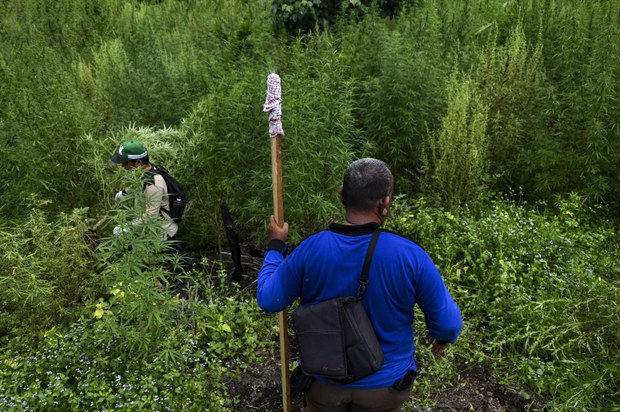Indonesia Revokes More Than 2,000 Mining, Forestry Permits
2022.01.06
Jakarta
 Members of Indonesia’s National Narcotics Agency (BNN) clear and destroy marijuana plants at a forest line in Lamteuba, Aceh province, Oct. 19, 2021.
Members of Indonesia’s National Narcotics Agency (BNN) clear and destroy marijuana plants at a forest line in Lamteuba, Aceh province, Oct. 19, 2021.
Indonesia’s leader announced Thursday that his administration was revoking more than 2,000 mining and forest-use permits to correct inequality and protect the environment, two months after he signed global pacts to reduce deforestation and coal-fueled power plants.
President Joko “Jokowi” Widodo voided these permits amid a dispute with Indonesian coal producers, whose exports the government banned for January because mining companies did not meet their domestic supply obligations.
“We will revoke permits that are not executed, which are not productive, which are transferred to other parties and which are not in accordance with the designation and regulations,” Jokowi said in a live broadcast via YouTube.
“We will continue to evaluate permits for mining, forestry, and state land use thoroughly.”
Jokowi said the government revoked 2,078 mineral and coal mining permits owned by firms that had failed to provide work plans, had misused the permits, or transferred them to other parties. The government did not release the list of revoked mining or plantation permits.
“Permits have been granted for years but they were still inactive. This has turned natural resources that should be used to improve people’s welfare hostage,” the president said.
His administration also revoked 192 forestry permits covering more than 3 million hectares, or 7.4 million acres, for similar reasons.
Siti Nurbaya Bakar, the minister of environment and forestry, said the decision was in line with Indonesia’s commitment to overcoming the climate crisis engulfing the world.
“This is a very important step in responding to work priorities in the context of forestry management and efforts to improve the environment and reduce natural damage,” Siti said.
“If we talk about Indonesia’s commitment related to climate change, this step will support the FOLU net [carbon] sink 2030 agenda; meaning that by 2030, the forestry sector, greenhouse gas emissions must be zero in total,” she added. “So, the revoked forestry permits mean a lot.”
Forest and other land use (FOLU) net carbon sink is zero when emissions from land- and forest-use activities are equal to their absorption. Meanwhile, zero deforestation is defined as no new clearing of forest and land.
Indonesia was among 133 nations that signed the pledge at the United Nations Climate Change Conference, or COP26 summit, in Glasgow to end and reverse forest loss by 2030.
But Indonesia had a different commitment to zero deforestation, saying this was unfair for its development because the country still had a lot of work to do in building evenly distributed infrastructure, especially in rural areas.
According to the environment ministry, Indonesia has already made strides in stemming deforestation. The ministry said Indonesia lost 115,459 hectares (285,300 acres) of forest cover in 2020, a 75-percent drop from 2019.
Land for ‘farmers, Islamic boarding schools’
Jokowi said the government would use the revoked state-owned land to provide opportunities for equitable use of assets for community groups as well as religious schools.
“These include farmers, Islamic boarding schools, and so on that can partner with credible and experienced companies,” Jokowi said.
The country, he said, was also open to credible investors who have a good record and reputation, and are committed to contributing to the public welfare and preserving nature to manage the land.
An environmental activist praised the move but expressed hope that government would be more careful in the future about granting new permits.
“Finally, there are concrete steps from the government to evaluate and revoke mining permits,” Zenzi Suhadi, director of Walhi, an Indonesian conservation group, told BenarNews.
But the government must consult with the communities living around the areas where permits have been revoked, especially the indigenous people who have been marginalized, before transferring land to other parties, he said.
Zenzi also urged the government to be transparent about which companies had their licenses revoked.
“Don’t let the revocation be just a process to give permission to other companies [instead],” he said. “We have to learn from the mistakes of the past and improve what we have today.”
Coal export ban
Meanwhile, Febry Calvin Tetelepta, deputy chief of the presidential staff, said the decision to temporarily ban coal exports was to protect the national interest and be secure amid a global energy crisis.
Last week, the Ministry of Energy and Mineral Resources stopped coal companies’ exports for January, saying they had failed in their obligation to supply at least a quarter of their output for domestic needs. The ministry added that the shortfall could affect nearly 20 power plants, which generate electricity for 10 million consumers.
Febry said the ban was justified because the country must provide electricity for the people. Coal-fired power plants supply 65 percent of Indonesia’s electricity needs.
Also on Thursday, the government dismissed an energy director at PT Perusahaan Listrik Negara (the State Electricity Company) which operates coal-fired power plants, saying the move was “part of efforts to improve the performance of the company.”
The energy ministry said it would re-evaluate its ban by Jan. 5. However, as of Thursday, there was no announcement.
Indonesia, one of the world’s largest thermal coal suppliers, exported 29 million tons of coal in January 2021, slightly down from 32 million tons in January 2020.
Almost 32 percent of Indonesia’s total coal production of 405 million tons went to China in 2020. Other top buyers included India, the Philippines, Japan, Malaysia and South Korea.







